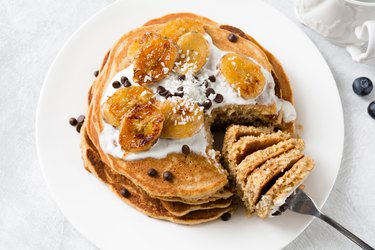
Before you throw out a banana because it has turned brown or has black spots inside and seems past its eating prime, consider the potential nutritional benefits it provides. Brown bananas have a higher level of antioxidants than yellow or green, unripe bananas. They're also easier to digest for people with digestive ailments, including irritable bowel syndrome and functional abdominal bloating.
Better Source of Antioxidants
Video of the Day
Brown, yellow or green bananas are all a good source of potassium, vitamin B-6 and fiber. As a banana reaches the brown stage, its concentration of antioxidants increases. Antioxidants are important in helping to protect your body against disease-causing inflammation. As bananas turn brown, though, some of the micronutrients present do diminish. Store ripe bananas in the freezer to reduce this loss.
Video of the Day
Browning Means Higher Sugar Content
In brown bananas, the resistant starch has almost completely transformed into simple sugars. When you eat a brown banana, your blood sugar spikes more quickly than it does when you eat a green one, which means it has a higher glycemic index. The glycemic index is a tool that measures how carbohydrate-containing foods affect blood sugar. Eating more low-glycemic foods may make it easier for you to manage your weight and reduce your risk of chronic health conditions such as diabetes and heart disease. If you have diabetes, you may want to stick with the less-ripe bananas to reduce risk of a spike in blood sugar. While brown bananas offer some health benefits, you may prefer less-ripe bananas if you're trying to cut back on sugar or keep blood sugar levels steady.
Read More: Tricks to Prevent Bananas From Turning Brown
Promoting Easier Digestion
Because a brown banana is mostly simple sugar, it's easy to digest. People with irritable bowel and other digestive ailments may avoid a number of fruits due to the various carbohydrates they contain that wreak havoc on their digestive system, such as causing gas, abdominal pain, constipation or diarrhea. But if you have a digestive disorder, you may find brown bananas are more agreeable to your system. However, watch for rotten bananas that are too far past their prime. If it smells funny, is squishy or shows signs of leaking or mold, it's not fit to eat and should be thrown away.
Read More: Is Eating a Banana a Day Healthy?
Possible Cancer Impact
A Japanese study published in Food Science and Technology Research determined that the black spots on the inside of bananas produce a substance called Tumor Necrosis Factor, which breaks down abnormal cells — including those that cause cancer. Brown bananas can't cure cancer, but consuming them might boost your immune function.
Read More: 16 Surprising Facts About Bananas
Tips for Using Brown Bananas
When your bananas turn brown, the obvious solution is to make banana bread. However, there are many other things to make with overripe bananas. Add mashed bananas to pancake batter to boost potassium. Substitute pureed bananas for some of your sugar to add sweetness to your cookies and cakes for a healthier dessert. Stir some mashed banana into a warm bowl of oatmeal and add a dash of cinnamon and some chopped nuts to make it even better. Blend frozen banana slices to create a simple vegan ice cream or stir the frozen slices into a regular ice cream base
If you don't have the time to use your brown or bruised fruit immediately, you can freeze bananas for later use. Simply peel them and store them in a sealed plastic bag for up to two months. To use for baking, defrost in the refrigerator overnight or pop into the blender frozen with other fruit for a nutritious smoothie.
- Oprah.com: Should You Eat a Banana Before It's Ripe?
- One Green Planet: Ripe vs. Unripe Bananas: Which Are Better for You?
- Food Science and Technology Research: Differences in Biological Response Modifier-Like Activities According to the Strain and Maturity of Bananas
- University of Sydney: About Glycemic Index